- Centre Home
- About us
- Products & Services
- Biorefining Tech Transfer Centre
- IPPS
- News and Resources
- News archive 2019
- News archive 2018
- News archive 2017
- News archive 2016
- News archive 2015
- News archive 2014
- News archive 2013
- News archive 2012
- News archive 2011
- News archive 2010
- News archive 2009
- News archive 2008
- News archive 2007
- News archive 2006
- Publications and reports
- Mould Training School
- FAQs
- Annual Reports
- Links
- Contact Us

The BC offer is a broad one, encompassing products and services for a wide range of industries at every stage of the evaluation, research, product development, product trial and manufacturing processes.
News Archive 2016
December 2016
Researcher Links Workshop on Nano-Biomaterials for water purification - 12 to 16 December 2016, India
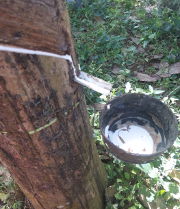 Access to safe water is becoming increasingly limited due to poor drinking water resources and maintenance of water quality is a major challenge. Increased water pollution is another major threat due to the growth of industrialization, urbanization and a number of anthropogenic activities.
Access to safe water is becoming increasingly limited due to poor drinking water resources and maintenance of water quality is a major challenge. Increased water pollution is another major threat due to the growth of industrialization, urbanization and a number of anthropogenic activities.
A five-day researcher links workshop on “Nano-Biomaterials for Water Purification” has been jointly conducted by BioComposites Centre, Bangor University with Mahatma Gandhi University, Kottayam, India. Vice-Chancellor Prof Babu Sebastian of Mahatma Gandhi University inaugurated the workshop at a function held at the chemical sciences seminar hall in Kottayam, India.
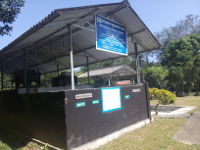 The workshop was very well organised and able to covey the need for water purification and its challenges to bring new innovation for developing cost-effective solutions using advanced materials. Early Career Researchers from UK and India participated and shared their research ideas and brain stormed several topics to work jointly. The event provided a unique opportunity for the participants to share research expertise and scientific networking.
The workshop was very well organised and able to covey the need for water purification and its challenges to bring new innovation for developing cost-effective solutions using advanced materials. Early Career Researchers from UK and India participated and shared their research ideas and brain stormed several topics to work jointly. The event provided a unique opportunity for the participants to share research expertise and scientific networking.
Mentors from top institutes i.e. Prof. Suryasarathi Bose IISc, Bangalore; Prof. Ligy Philip IIT, Chennai; Prof. Kuruvilla Joseph IIST, Trivandrum; Dr Graham A. Ormondroyd Bangor University, UK; Prof. Rakesh Kanda Brunel University London joined the event.
Dr. R.T. Durai Prabhakaran and Prof. Sabu Thomas designed the technical program to cover many scientific plenary speeches, social networking events and a visit to a wastewater treatment facility - the Effluent Treatment Plant at MALANKARA RUBBER FACTORY, Thodupuzha.
Overall the workshop was a great success in terms of knowledge sharing and networking.
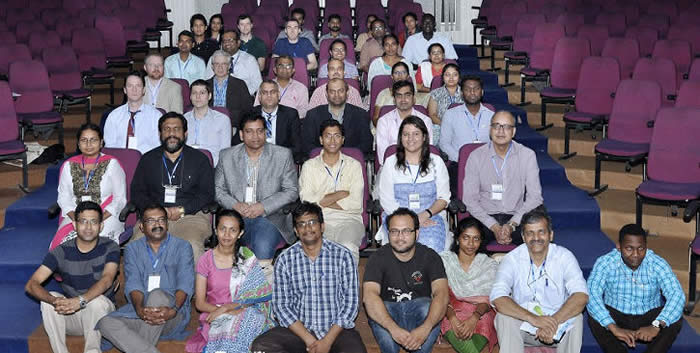
November 2016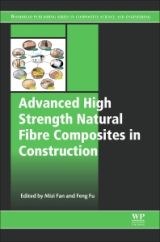
BC staff have contributed a chapter 'Chemical composition of natural fibres', to a new book 'Advanced High Strength Natural Fibre Composites in Construction' (Editors: M.Fan, F. Fu. Woodhead Publishing, Cambridge, UK). The chapter gives details the groups of chemicals found in natural fibres and goes on to describe differences in fibre types found in various plant parts. The effect of chemical modification is discussed along with various analysis techniques to determine chemical composition of plant material. The chapter ends with details of ememging technologies which will improve our understanding of the chemical composition of natural fibres.
October 2016
BC is part of new BioPilotsUK alliance supporting UK bioeconomy growth
BC is delighted to be part of a new UK alliance – BioPilotsUK, launched to support the growth of the UK bioeconomy . The launch was announced at the European Forum in Industrial Biotechnology and the Bioeconomy (EFIB) 2016.
Five established R&D centres across the UK have come together to form the new BioPilotsUK alliance. They are BEACON (Wales), the Biorenewables Development Centre (BDC - York), the Centre for Process Innovation (CPI - Redcar), IBioIC (Scotland) and The Biorefinery Centre (Norwich). This alliance will seek to position Britain as a global leader in biorefining technology development and bio-based product manufacture – two key elements of the bioeconomy.
BioPilotsUK brings together the nation’s leading expertise and facilities to help innovative ideas navigate the so called “valley of death” by demonstrating new bio-based processes and products at a commercially-relevant scale, in turn helping clients invest in the right technologies to grow their businesses.
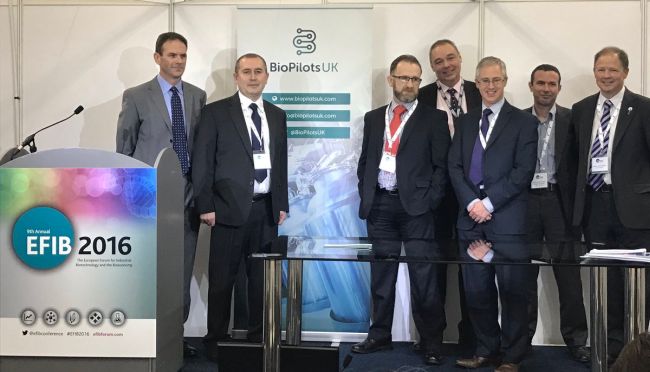
“What we are all about is supporting the transition away from fossil resources by making the best use of biorenewable materials and unavoidable wastes,” said Adam Charlton, BEACON Project Manager from BC, Bangor University. “As an alliance, we can significantly de-risk the innovation process for anyone exploring a bio-based idea.”
By working collaboratively, the alliance seeks to significantly speed up the commercialisation of new green processes and products from biomass, including: plants, algae, and wastes.
Due to the varied nature of these raw materials, or feedstocks, there is no ‘one size fits all’ approach to biorefining, rather a series of technologies that must be trialled and combined. Now, the new alliance can quickly assemble the right team for any given bio-based project using expertise and facilities from across the five centres.
BEACON was established in 2011 backed by £10.6 million from the European Regional Development Fund through the Welsh Government. A further £12 million investment again funded by Welsh Government, backed by £8 million of EU funds for BEACON+ supported the project into the second phase in December 2015.
The bioeconomy offers a multi-billion-pound, global business opportunity: it is worth around €2 trillion in Europe alone and is growing rapidly worldwide. Offering the potential to deliver greater business value through social, environmental and financial benefits, it is estimated that the UK bioeconomy is already worth £153 bn in gross value-added (GVA) terms, generating over 4M jobs*.
“BioPilotsUK will enable Britain to realise the potential to tap both bioresources and biotechnology to create novel industrial products and processes necessary for an economically and environmentally sustainable nation,” notes Keith Waldron, Director, the Biorefinery Centre.
Professor Iain Donnison from Aberystwyth University’s IBERS (Institute of Biological, Environmental and Rural Sciences) is Director of BEACON and said:
“BEACON is developing new green technologies, to reduce greenhouse gas emissions, which are needed to deliver on the Paris climate agreement signed by world leaders at the United Nations earlier this year. Such low carbon technologies also offer new opportunities to support economic activity and jobs, in both urban and rural Wales.”
The CO2 Lab Spins out to form Suprex
The Minister for Skills and Science, Julie James, officially opened Suprex on Monday 10th October. Suprex is a contract research organisation and is the only commercial organisation in the UK able to develop process applications for carbon dioxide (CO2) up to pilot scale.
Suprex, based in Caernarfon, is a spin-out of the CO2 Lab from the BioComposites Centre, Bangor University and is a joint venture between Phytovation Ltd and Bangor University.
The CO2 Lab, led by Professor Ray Marriott, became the preeminent centre for research into the use of supercritical carbon dioxide in the UK. In 2012, the Welsh Government supported laboratory expansion with a grant of £345,000, in recognition of the huge potential environmental benefits of the technology, which replaces traditional solvents with an environmentally benign alternative.
Suprex uses a cutting edge method of processing which is greener and more environmentally friendly than traditional methods. The process has applications across a wide range of industries including flavours, fragrances, cosmetics, personal care, nutraceuticals and pharmaceuticals. It is the only organisation in the UK capable of doing this type of research work.
The company currently works with a number of universities in the UK, as well as a broad range of blue chip businesses and SMEs and are actively working on new collaborative projects.
More information about the event at Bangor Univesity News and Welsh Government News.
June 2016
Ellen MacArthur Foundation
BC has become part of the Ellen MacArthur Foundation Network Universities. The Network Universities programme aims to enable collaborative ventures and knowledge exchange across policy makers, business and academia outside the Foundation’s formal programmes by showcasing relevant academic work globally. The Ellen MacArthur Foundation was established in 2010 with the aim of accelerating the transition to the circular economy. Since its creation the charity has emerged as a global thought leader, establishing circular economy on the agenda of decision makers across business, government and academia. We are proud to be part of this Network and look forward to global interactions in leading research for supporting the Circular Economy.
May 2016
On May 27th Dr Morwenna Spear and Dr Simon Curling demonstrated the BC’s work at the Wild Forest Products Fair at Glynllifon North Wales. The fair was a knowledge exchange event organised by the European funded StarTree project aimed at educating and informing communities about the resources, both timber and non timber alike, found in woodland and forest areas.
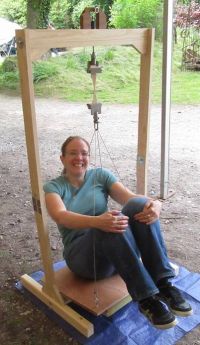
The BC exhibit focused on explaining how different timber types and products are suited for differing uses based on their material properties. An interesting demonstration on the tensile strength of wood (kindly loaned by the Wood Technology Society) proved popular demostration. The exhibit also showed how advancements in understanding wood properties combined with the development of engineered wood products is leading to a resurgence in building with wood, including new tall wood structures.
Information on other biomaterials, such as plant and animal derived fibres (e.g. hemp and wool) and how they can be used in modern buildings (eg insulation materials being developed in BC’s ECOSEE project) were also highlighted. The incorporation of biomaterials and engineered timber in buildings, and use of plants in urban greening options such as vertical gardens and green roofs were also demonstrated. This area of BC’s research under the NRN-LCEE Plants and Architecture cluster proved especially topical with many visitors discussing their own experiences and buildings.
Successful kick-off meeting for Innovate UK funded project
On May 12th the first meeting for a feasibility study looking at Innovative Wood Composite Poles was held at BC in Bangor. The project, funded by Innovate UK, teams the expertise of the BC with the innovation of Pollywood ltd from North East England in developing innovative designs for composite wooden poles.
Project collaboration with the Met office
On 5th of May the Met Office hosted a fact finding workshop for the NRN-LCEE at their state of the art facility in Exeter. BC attended along with colleagues from the Plants and Architecture cluster to discuss their work on urban greening, which has the goal of synergistically combining materials, plants and architecture using a multifunctional approach to improve the urban environment. Climatic conditions within urban areas can differ quite markedly from the surrounding region and the cluster had excellent discussions with the Met office Urban Modelling team that will be very beneficial for the project goals. The long term climatic modelling performed at the Met office will also be key in directing the development of appropriate vegetation planting schemes and assessing building and architecture requirements in the future.
The BioComposites Centre is part of the National Research Network for Low Carbon Energy and Environment (NRN-LCEE) as a member of the Plants and Architecture cluster (with Aberystwyth and Cardiff University).
BC and the Plants and Architecture cluster would like to thank the Met office for their time and engagement during a fascinating and productive visit.
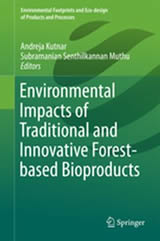
Graham Ormondroyd, Morwenna Spear and Campbell Skinner have contributed to a new book: 'Environmental Impacts of Traditional and Innovative Forest-based Bioproducts'.
The chapter entitled ‘The opportunities and challenges for re-use and recycling of timber and wood products within the construction sector’, addresses many factors which have influenced the reuse and recycling of wood in the UK over a 20 year period to 2015. Drawing on a wide range of reports and data for the sector, the main trends are described. These include early adoption of standards for the quality of recycled wood in the particleboard industry, clear segregation of waste wood by origin and level of expected contamination, and the development of the bio-mass energy market. The construction sector presents several challenges when reclaiming, re-using or recycling timber. Significant progress has been made by new legislation and through initiatives, best practice and the development of waste transfer stations and businesses utilising waste wood. Further avenues of research and emerging technologies are also discussed.
The book is available from Springer (http://www.springer.com/gb/book/9789811006531?token=prtst0416p).
April 2016
Young Researcher's Forum III - Innovation in Construction Materials
Elie Mansour, PhD student at BC gave a presentation at the Young Researcher's Forum III. He talked about his work looking at insulation material and its contribution on indoor air quality. The presentation showed how the use of wool fibres contributes to better air quality through the absorption of VOCs, and how absorption varies depending on wool types, airborne concentrations and the make-up of the concentrations.
The Forum gave an opportunity for young researchers involved in construction materials to present their work and exchange ideas in a friendly and supportive environment. Subjects included cement, geopolymers, wood and timber.
The meeting was organised and hosted by the Department of Civil and Environmental Engineering at Imperial College London and is promoted by the Cementitios Materials Group of The Institute of Materials, Minerals and Mining, The Institute of Concrete Technology and The Mineralogical Society.
Short Term Scientific Mission in Norway
Graham Ormondroyd visited colleagues at NIBIO to learn DNA sequencing methods to assess very early decay in timber.
The work to be undertaken within this short-term scientific mission will seek to assess the effects of very early on-set decay on the dynamic modulus of Norway spruce. The work will be focused around two techniques, the first being the quantification of fungal DNA within the timber using real-time PCR (qPCR) and secondly analysis of the change in mechanical properties through Dynamic Mechanical Analysis (DMA) timber that has been under decay conditions for between 1 – 3 weeks.
The data will be analyzed and a model built to be able to predict the drop in modulus from the quantitative gene expression within the timber. Once the technique has been fully developed and the models built these will be developed for other timbers including modified wood.
The mission is funded by COST through the Action FP1407 ‘Understanding wood modification through an integrated scientific and environmental impact approach (ModWoodLife)’
BREAD4PLA nominated for Best LIFE Environmental project
BC’s BREAD4PLA project has recently been shortlisted as one of the ‘Best LIFE Environmental projects’ award by a panel of EU experts. The project demonstrated the potential of a closed loop recycling system, which could utilize the 175,000 tonnes of industrial bakery residue currently produced in Europe.
BREAD4PLA demonstrated that Polylactic Acid (PLA) could be viably made from waste products of the bakery industry, using enzymatic synthesis, in a continuous pilot plant process. The PLA was then used to make 100% biodegradable film which can be used for packaging bakery products.
More information is available at the BREAD4PLA project website.
To be shortlisted for the award a set of ‘best practice’ criteria are evaluated. These are key issues of the projects’ contribution to immediate and long-term environmental, economic and social improvements; their degree of innovation and transferability; their relevance to policy and their cost-effectiveness.
Receiving the nomination of a Best LIFE project is therefore a significant achievement as it shows that results from the project, if widely applied, could have the most positive impact on the environment.
25 projects are in the running and the award will be judged by public vote. Information about these projects is on the Life programme website.
Public voting for the Best LIFE EnvironmentalAward 2015 is now open to everyone through the EU survery website.
Why not take a look at the 25 projects that are in the running and use your vote?
**** VOTE NOW! ****
March 2016
Exhibiting at Woodbuild Wales gave BC an opportunity to promote recent research on construction related materials to an audience of architects, construction and building companies. The well-attended event sponsored by Welsh Government combined trade stands and a keynote talk from Edwina Hart, Welsh Minister for Economy, Science and Transport.
BC’s research on wood based material used in construction such a heat treated wood for cladding applications and recycled MDF insulation were displayed. “The breadth and nature of the enquiries was fantastic and showed that there is a real appetite in Wales to use timber and timber products” added Dr Graham Ormondroyd.
At the event Bangor alumni and past employee of BC, Gary Newman of Wood Knowledge Wales launched his Manifesto for Wood. This document sets out an integrated plan to stimulate the Welsh Wood Sector. Dr Rob Elias, Director of BC, welcomed this approach and added “The Manifesto sets out some key challenges for our sector and we need to look at how these can be addressed through collaborative research projects and I look forward to working with Gary to develop his plan”.
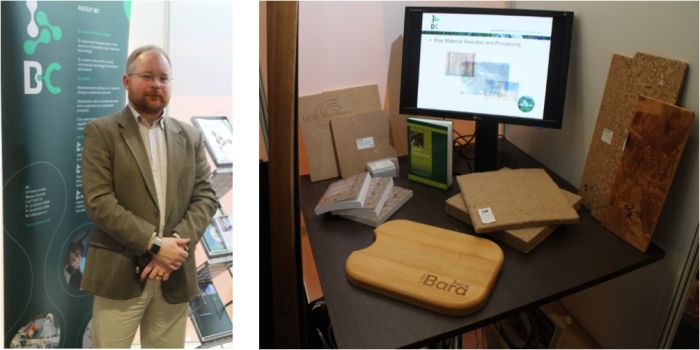
On March 12th Bangor University hosted its Hidden World exhibition as part of Bangor Science week. The exhibition consisted of a range of displays and demonstrations to introduce Bangor University research to the public. The BioComposites Centre, as part of our research dissemination and S.T.E.M. education commitments, presented two aspects of our work. The first a display of the wide range of uses and properties of wood which proved fascinating for young and old alike. The most eye catching part of this display was a 3.5m high tower of wood (kindly lent to us by the Wood Technology Society) emerging from a photograph of Wembley stadium as a scale representation of the amount of wood products used in the UK in one year.
The second display featured BC’s work on indoor air quality as part of the ECOSEE and NRN-LCEE projects. This topic has been in the media recently and BC’s novel approach using natural materials to improve indoor air quality attracted a lot of attention. The display utilised sensor technology provided by Caernarfon based PPM technology. This proved very useful as a hands-on method of demonstrating the issues raised, especially as the day progressed and the room warmed up from all the visitors !
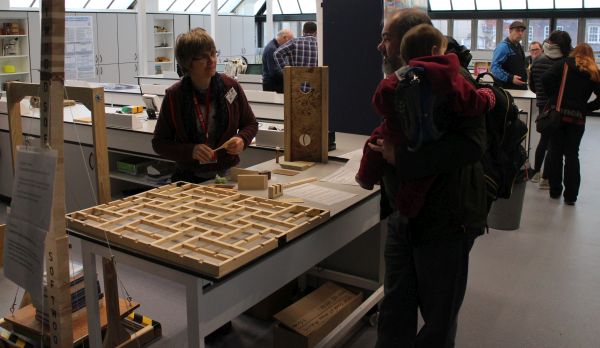
BC exhibited at EcoBuild, 8-9th March 2016, as part of the ECO-SEE project. Our display highlighted the work to date undertaken within the European funded project and showcased the new and novel materials that have been developed.
Our stand was well attended with over 200 people registering their interest in the project. Dr. Ormondroyd commented, ‘It was great to see such a variety of people taking an interest in the research, from academics to first time self builder to large housing companies. The recent media attention that has been given to indoor air quality has certainly peaked peoples interest.’
The ECO-SEE project has now entered the demonstrator phase and the new materials developed at the BC will be progress to full building evaluation.
New 'Wood Composites' book out
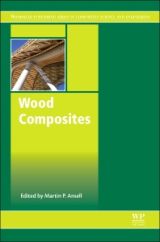
Members of the BC materials group have recently contributed to a new book ‘Wood Composites’ edited by Dr. Martin Ansell and published by Woodhead Publishing.
The book brings together 20 experts in the field of wood composites and covers a variety of topics ranging from the traditional (such as plywood) to new and novel concepts such as bio-mimicry, char composites and nano-coatings. The book aims to be an invaluable resource for anyone with an interest in wood composites and their applications, including R&D managers in the timber industries, wood scientists, timber engineers, architects, civil engineers and postgraduate researchers.
BC staff provided four chapters for the book including fundamentals, traditional composites and new and novel concepts.
Wood Composites is now available from Woodhead Publishing (http://store.elsevier.com/Wood-Composites/isbn-9781782424543/)
February 2016
Job vacancy - Research Scientist, The CO2 Lab
We are currently looking for recent PhD graduate with a strong interest in supercritical CO2 processing with excellent practical/technical skills and leadership potential to develop research skills.
The role will involve the support and delivery of a variety of research projects with commercial companies. Work will range from the investigation of the isolation and fractionation of natural products to derivatisation and the production of ultraclean materials. The supercritical CO2 research group is well equipped with four laboratory rigs, a pilot plant and comprehensive analytical facilities to support this work.
A recent PhD in an appropriate science (physics, chemistry or natural products science) subject is sought. The successful candidate should show a willingness and ability to learn new techniques quickly and efficiently and be able to solve day-to-day laboratory and scale-up problems.
The successful candidate will be expected to commence as soon as possible and the post is available for a period of 12 months.
Informal enquires to Prof Ray Marriott
More details and how to apply available at Bangor University Job Opportunities web page.
January 2016
Frankincense - fit for a king and novel applications
Epiphany, a Christian celebration, marks the arrival of the three kings, wise men or magi, with their gifts of gold, frankincense and myrrh for the infant Jesus. Frankincense is a natural substance, which was greatly valued in the ancient world and considered a precious gift fit for a king.
Frankincense is a natural resin product made from Boswellia tree sap. It is harvested in a number of countries in Asia and the Horn of Africa, principally Somalia, Ethiopia and Oman. The quality and properties of the resin varies between the species of tree and harvest location.
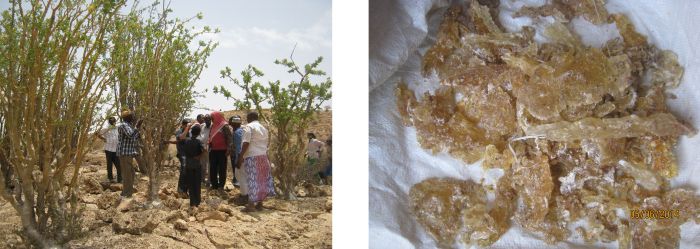
Photos: Frankincense trees and purified frankincense
Frankincense was valued historically, and used as incense in religious ceremonies, while certain frankincense species were used for medicinal purposes. Today the Compton Group, part of the Swansea based Ballard Family, are interested in developing new uses for extracts from frankincense. Of particular interest is the species Boswellia frereana, often called the “king of frankincense”, or Asli in Arabic, that is found growing naturally only in Somalia. It has a different bouquet of chemicals to that of other Boswellia species.
Modern bio-purifying techniques available at a specialist unit at Bangor University have enabled scientists and commercial developers to work together to isolate, identify and measure the purity of some of the active ingredients within the natural product. These methods enable companies to develop pharmaceuticals or nutraceuticals from natural products, in the knowledge that the active ingredients are pure and will behave in a consistent manner which is essential for good manufacturing practice and quality control of the finished product.
The work completed by Bangor University’s School of Chemistry and BioComposites Centre, through the BEACON project, should enable commercial development of new uses and applications for new products derived from frankincense.
Dr Ahmed Ali is research consultant to the Compton Group, who are in discussions with commercial collaborators in the USA investigating commercial developments and efficacy testing of new products based on frankincense. These will enable people to use and appreciate the benefits of frankincense.
Dr Ahmed Ali, who is of Somalian origin, explains: “I’ve been investigating frankincense for over ten years and am delighted that developments are moving apace. Modern pharmaceuticals and nutraceuticals need to be tested for their quality and purity. Having access to test facilities such as those at Bangor University, through the BEACON project, enables companies such as ours to investigate new uses for natural materials.
"Previous research has established that frankincense could help people with arthritis. It is hoped that not only will pain be relieved, but also further damage to ligaments and bones will be prevented. The Compton Group are speaking with companies who want to commercialise and develop applications of new frankincense based products for these large and important markets."




